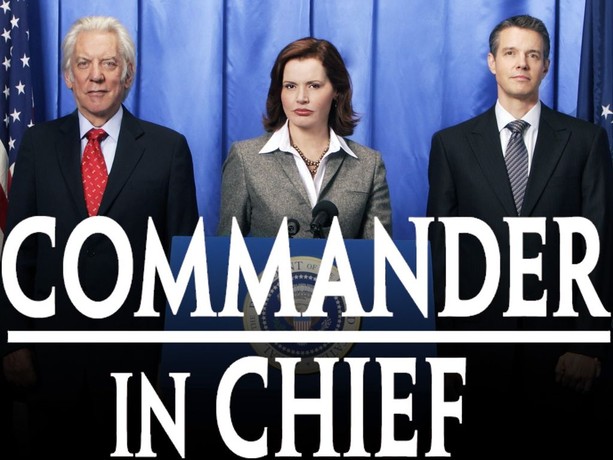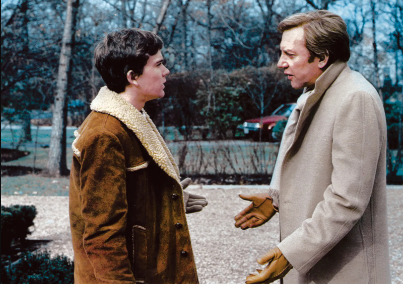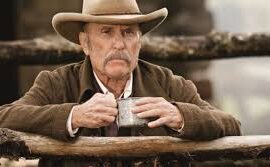
Donald Sutherland had been a major movie star for decades before he appeared opposite Geena Davis in the 2005-06 ABC drama Commander in Chief.
I was one of the reporters hoping to get a few words with the acclaimed actor on a visit to the L.A. set of that short-lived series. Davis played the first female president of the United States. Sutherland played her arch rival, the speaker of the house.
Sutherland, who passed away at 88 in Miami Thursday after a lengthy illness, joined his cast mates sitting before a mammoth replica of Air Force One. Critics were seated in the soundstage, listening mainly to prolific showrunner Steven Bochco, brought in in a vain attempt to rescue the series. The executive producer later suggested it was not a happy set, which seemed evident on that press day.

After the formal press conference, three of us crammed in front of Sutherland, recorders extended. A tall man, he fixed his eyes on us one at a time as we each asked a question. Then he dismissed us all with surgical proficiency, and walked away.
I was writing for The Toronto Sun at the time and needed more from this famous Canadian. I walked around to where Sutherland was sheltering with the cast and crew and attempted a Hail Mary follow-up.
I had read that the Saint John, New Brunswick, native was a devoted fan of the Montreal Expos and would watch them live whenever he could. It was also reported that Sutherland used the painful memory of the defunct ball club’s being denied their one and only chance at a World Series berth in order to cry on cue for a scene. I had to ask: “Was that true?”
advertisement
Sutherland stood before me but seemed gone, having traveled back in time to October of 1980, and the horrors of what Expo fans call, “Blue Monday.”
“The well-named Jim Fanning walked out of the dugout…” Sutherland began, quietly narrating the sequence of events that led to a pitching change, a sinking fastball thrown to the Dodgers’ Rick Monday, and the ball sailing over the centerfield fence.
There was no joy in Montreal, but Sutherland was hitting nothing but home runs by the time the ‘70s ended. After small roles in British films in the early ’60s, an appearance on the BBC spy series The Saint opposite Roger Moore helped him land a small but very cool role opposite Lee Marvin, Charles Bronson and others in 1967’s “The Dirty Dozen.” Then came “M*A*S*H,” “Kelly’s Heroes,” “Klute,” “Don’t Look Now,” “Invasion of the Bodysnatchers” a small part in “Animal House,” and “Fellini’s Casanova.”

Director Robert Redford and Mary Tyler Moore stole all the Oscar buzz with 1980’s “Ordinary People” but it was Sutherland’s role as a damaged husband and father that for me grounds the film.
He worked with many top film directors, including Redford and Fellini, Robert Altman (“M*A*S*H”), Nicolas Roeg (“Don’t Look Now”), Bernardo Bertolucci (1976’s “1900”), John Schlesinger (1975’s “Day of the Locust”) and Oliver Stone (1991’s “JFK”).
Many feel Sutherland is among the best actors to never be nominated for an Academy Award. He did, however, receive an Academy Honorary Award in 2017.
In 2019, when I interviewed Sutherland’s co-star in “Klute,” Jane Fonda, I asked her to share some thoughts on the actor and got more than I bargained for.
“Yes, we were lovers,” she immediately volunteered. After “Klute,” the two went straight into a second film, 1973’s “Steelyard Blues.”

Sutherland is often mentioned in connection with an extremely frank – especially for the time – sex scene opposite co-star Julie Christie in the 1973 horror film “Don’t Look Now.” During a press tour session for the series 24, I asked Sutherland’s son Kiefer if he’d seen the movie. Kiefer admitted he had, but said he had to look away; that was, after all, his dad’s butt up there on screen.
Donald’s marriage to actress Shirley Douglas – Kiefer and his twin sister Rachel’s mom – did not last long. One of Kiefer’s earliest memories is of his famous dad’s classic Jaguar E-Type roadster. Kiefer says he felt guilty years later realising his dad had to give the car up because there was no room for twin car seats.
Sutherland’s third marriage, to actress Francine Racette, lasted over 50 years.
Sutherland had the usual highs and lows in his decades-long acting career but always kept working. He was terrific in Stone’s “JFK.” “Citizen X” is a taut thriller from 1995. He was effective in early scenes in a remake of “The Italian Job.” “The Hunger Games” and their sequels brought him before a whole new audience.
As did television, where he shone later in life in series such as The Pillars of the Earth and Trust. I spoke with him again, along with other reporters, during a press tour session for the latter series on FX. Sutherland, who remained seated after the session, was a pussycat that day – charming, humble and reflective. His death, following the passing in recent years of Norman Jewison, Gordon Pinsent and Christopher Plummer, seems an end of a grand generation of talented actors and filmmakers who made Canadians proud from coast to coast.






